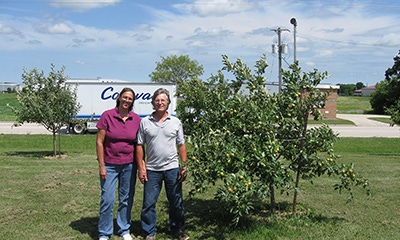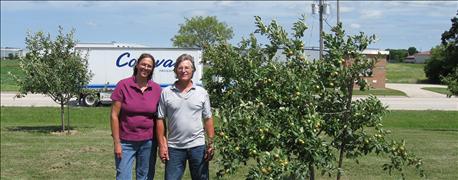September 4, 2015

If it's Wednesday or Saturday, mid-spring into fall, you'll find Bill and Lynda Zeleske in their tented stand at Fond du Lac's Farmers Market. That means if it's Tuesday or Friday they're picking and washing fruits and vegetables for the next day's sale.
The rest of the week they tend their gardens and orchards at their Fondy Fruits and More farm, picking for Lynda to can (up to 1,000 jars and 20 different items this year) or work on her craft projects, all of it for sale. They also sell at Fond du Lac's indoor winter market. Bill serves on the steering committee for the Fond du Lac markets.

SWITCHING GEARS: In 2010, Bill and Lynda Zeleske sold their cows and started growing fruits and vegetables to sell at farmer's markets and a roadside stand on their farm located on the south edge of Fond du Lac. They also grow corn and soybeans on their farm.
Growing fruits and vegetables wasn't in his career plan when he studied for a degree in accounting. Neither was dairy farming, which he did earlier.
"But things change," says Lynda.
So now the couple is building a thriving produce business while also growing corn and soybeans for cash grain to supplement their still-developing farmer's market income.
At one time, Bill was milking 90 cows with his dad, then 60 on his own. But "it's not easy on the body to milk cows by yourself," he says. "I asked Lynda one day what she thought about planting apple trees."
That was the beginning. Deciding to leave dairying, they set up a five-year plan and in 2010 planted 36 young apple trees. They're up to 140 fruit trees now, adding pears, peaches, plums, nectarines and cherries. Growing peaches and apricots in Wisconsin?
"Thank heavens for global warming," Bill laughs. He and Lynda laugh a lot. They work well togeth
er and acknowledge that they work hard, usually on their own, sometimes with help from their four children, all of whom live off the farm.
"When we tried to figure out what to do after dairying we wanted to have a business where we could be our own boss, and we get along real well," Bill explains.
Ten acres are devoted to produce. Pesticide use is as little as possible though Lynda acknowledges that sometimes means "sharing with bugs." Two heifer stalls have been converted to coolers and wash stands are being set up nearby. Bill is working on converting old concrete feed bunkers into raised and covered gardens so he can plant earlier in spring "to get a better start with the early stuff." The garden soil is a mix of one-third compost, one-third aged manure left from the dairy and one-third soil.
"Once we decided what we wanted to do, we read a lot of books" and toured other farms, Lynda notes. But then she laughs, "reading isn't like doing."
The couple also draws on Lynda's own gardening and canning experience. Like Bill, she grew up on a farm. Her mom had a large garden and did lots of canning. Lynda's crafts include repainted old chairs fitted for planters, and bowling balls set on legs and painted to look like round, fat bees and ladybugs. Her business degree means she keeps the farm records, superceding Bill's accounting degree. At the end of each selling season they go over her records "to determine what works," Bill points out. Some produce, they've learned, requires too much labor to be profitable.
"Every year we learn more," Lynda says. Currently, they raise and sell 24 different vegetables and lots of fruits, including raspberries, strawberries, blueberries and blackberries. This year they tried currents and gooseberries and began working with a few gas stations to expand their sweet corn market.
"We do like to have some things no one else has at farmer's markets," Bill discloses.
The existing farm where he grew up is an island surrounded by busy roads serving industrial and residential development on the city's edge so they also have set up a roadside stand. This is their third year of marketing and Bill acknowledges, "We're not where we want to be.... We see a big improvement every year but we have a ways to go. My hope is in three years we can call it 'money-making'. We are making money but not enough to where we don't need to grow corn or soybeans to supplement."
You May Also Like




